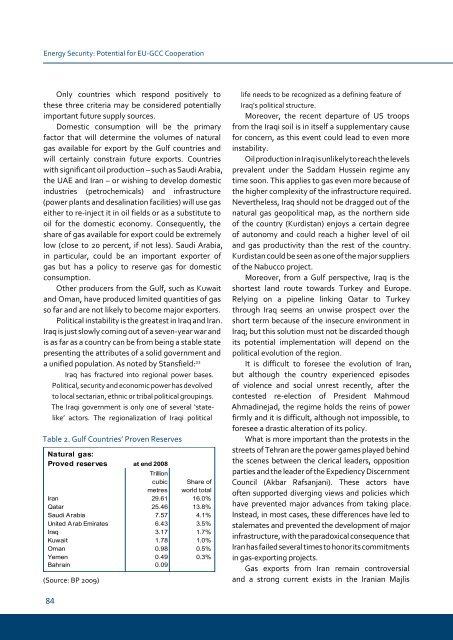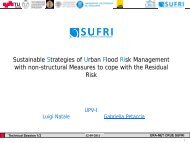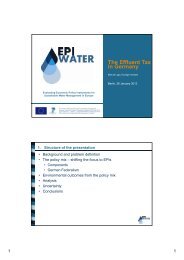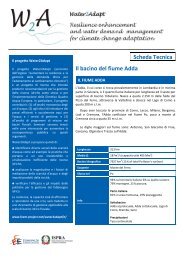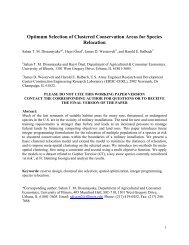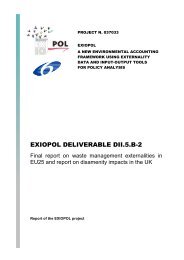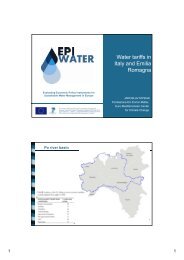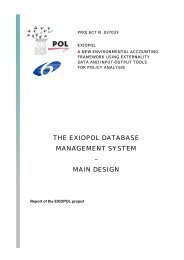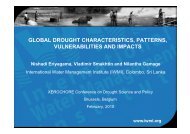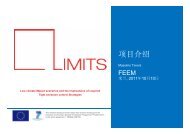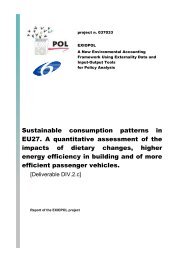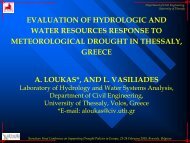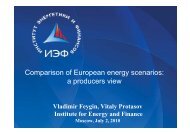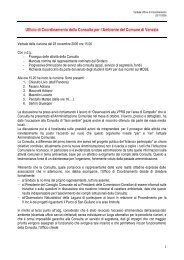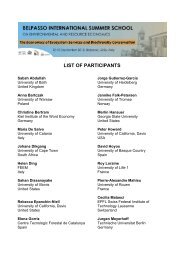Gulf and European Energy Supply Security - Feem-project.net
Gulf and European Energy Supply Security - Feem-project.net
Gulf and European Energy Supply Security - Feem-project.net
Create successful ePaper yourself
Turn your PDF publications into a flip-book with our unique Google optimized e-Paper software.
<strong>Energy</strong> <strong>Security</strong>: Potential for EU-GCC Cooperation<br />
Only countries which respond positively to<br />
these three criteria may be considered potentially<br />
important future supply sources.<br />
Domestic consumption will be the primary<br />
factor that will determine the volumes of natural<br />
gas available for export by the <strong>Gulf</strong> countries <strong>and</strong><br />
will certainly constrain future exports. Countries<br />
with significant oil production – such as Saudi Arabia,<br />
the UAE <strong>and</strong> Iran – or wishing to develop domestic<br />
industries (petrochemicals) <strong>and</strong> infrastructure<br />
(power plants <strong>and</strong> desalination facilities) will use gas<br />
either to re-inject it in oil fields or as a substitute to<br />
oil for the domestic economy. Consequently, the<br />
share of gas available for export could be extremely<br />
low (close to 20 percent, if not less). Saudi Arabia,<br />
in particular, could be an important exporter of<br />
gas but has a policy to reserve gas for domestic<br />
consumption.<br />
Other producers from the <strong>Gulf</strong>, such as Kuwait<br />
<strong>and</strong> Oman, have produced limited quantities of gas<br />
so far <strong>and</strong> are not likely to become major exporters.<br />
Political instability is the greatest in Iraq <strong>and</strong> Iran.<br />
Iraq is just slowly coming out of a seven-year war <strong>and</strong><br />
is as far as a country can be from being a stable state<br />
presenting the attributes of a solid government <strong>and</strong><br />
a unified population. As noted by Stansfield: 22<br />
Iraq has fractured into regional power bases.<br />
Political, security <strong>and</strong> economic power has devolved<br />
to local sectarian, ethnic or tribal political groupings.<br />
The Iraqi government is only one of several ‘statelike’<br />
actors. The regionalization of Iraqi political<br />
Table 2. <strong>Gulf</strong> Countries’ Proven Reserves<br />
Natural gas:<br />
Proved reserves at end 2008<br />
Trillion<br />
cubic Share of<br />
metres world total<br />
Iran 29.61 16.0%<br />
Qatar 25.46 13.8%<br />
Saudi Arabia 7.57 4.1%<br />
United Arab Emirates 6.43 3.5%<br />
Iraq 3.17 1.7%<br />
Kuwait 1.78 1.0%<br />
Oman 0.98 0.5%<br />
Yemen 0.49 0.3%<br />
Bahrain 0.09<br />
(Source: BP 2009)<br />
4<br />
life needs to be recognized as a defining feature of<br />
Iraq’s political structure.<br />
Moreover, the recent departure of US troops<br />
from the Iraqi soil is in itself a supplementary cause<br />
for concern, as this event could lead to even more<br />
instability.<br />
Oil production in Iraq is unlikely to reach the levels<br />
prevalent under the Saddam Hussein regime any<br />
time soon. This applies to gas even more because of<br />
the higher complexity of the infrastructure required.<br />
Nevertheless, Iraq should not be dragged out of the<br />
natural gas geopolitical map, as the northern side<br />
of the country (Kurdistan) enjoys a certain degree<br />
of autonomy <strong>and</strong> could reach a higher level of oil<br />
<strong>and</strong> gas productivity than the rest of the country.<br />
Kurdistan could be seen as one of the major suppliers<br />
of the Nabucco <strong>project</strong>.<br />
Moreover, from a <strong>Gulf</strong> perspective, Iraq is the<br />
shortest l<strong>and</strong> route towards Turkey <strong>and</strong> Europe.<br />
Relying on a pipeline linking Qatar to Turkey<br />
through Iraq seems an unwise prospect over the<br />
short term because of the insecure environment in<br />
Iraq; but this solution must not be discarded though<br />
its potential implementation will depend on the<br />
political evolution of the region.<br />
It is difficult to foresee the evolution of Iran,<br />
but although the country experienced episodes<br />
of violence <strong>and</strong> social unrest recently, after the<br />
contested re-election of President Mahmoud<br />
Ahmadinejad, the regime holds the reins of power<br />
firmly <strong>and</strong> it is difficult, although not impossible, to<br />
foresee a drastic alteration of its policy.<br />
What is more important than the protests in the<br />
streets of Tehran are the power games played behind<br />
the scenes between the clerical leaders, opposition<br />
parties <strong>and</strong> the leader of the Expediency Discernment<br />
Council (Akbar Rafsanjani). These actors have<br />
often supported diverging views <strong>and</strong> policies which<br />
have prevented major advances from taking place.<br />
Instead, in most cases, these differences have led to<br />
stalemates <strong>and</strong> prevented the development of major<br />
infrastructure, with the paradoxical consequence that<br />
Iran has failed several times to honor its commitments<br />
in gas-exporting <strong>project</strong>s.<br />
Gas exports from Iran remain controversial<br />
<strong>and</strong> a strong current exists in the Iranian Majlis


